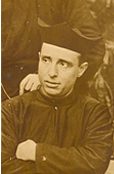The cutter McCollouch arrives in Manila from Hongkong, bringing aboard Emilio Aguinaldo with other [revolutionary] heads who sailed for that place last December. Aguinaldo’s story, as reported in the Daily Press of Hongkong is as follows. Hoping to take advantage of the Spanish-American war, Aguinaldo went to Saigon to confer with some of his associates, and on 21 April he proceeded to Singapore to seek the counsel of an Englishman named Award [sic for Howard] W. Bray who had been in the Philippines for fifteen years, Aguinaldo revealed his plan for an independent Philippines, offering to rally his countrymen against Spain if the United States
promised to recognize her independence. His justification was Spain’s failure to carry out the conditions under which the peace treaty between the Spanish government and the revolutionary leaders had been signed
last 14 December. According to Aguinaldo, these conditions were: (1) expulsion or secularization of the friars or religious orders and their inhibition in matters of civil administration, (2) general amnesty for all the rebels with guarantees for their personal safety against the vengeance of the Spaniards on returning to their towns. (3) radical reforms to extirpate abuses in the civil and military administration, (4) freedom of the press to be able to denounce corruption among the officials, (5) representation in the Cortes, and (6) abolition of the iniquitous system of secret judgments of exile for suspected political crimes. These conditions, according to Aguinaldo, formed the base of the peace treaty of last 14 December. But someone who saw and copied the treaty certified there were no such conditions, except a note which read: “The government shall attend to the just grievances of the natives without prejudice to the country’s progress.” Bray and Mr. Pratt, the American consul in Singapore received with joy Aguinaldo’s suggestions, and on 24 April the three had a meeting, in the presence of Leyva, Aguinaldo’s secretary, Gregorio Hilario del Pilar, and Marcelino Santos. Various telegrams were exchanged between Mr. Pratt, Commodore Dewey who then was in HongKong, and the Washington government. When that government accepted Aguinaldo’s proposition, the latter with his companions left for Hongkong on 26 April. When he arrived in Hongkong, the American squadron was already in the waters of Manila. Aguinaldo regrouped all his companions, except two, and in the first trip there of the cutter McCollouch, he boarded it with them and today he arrived in Cavite. Some Hongkong dailies of the 13th of this month carry a proclamation by Aguinaldo whose principal points are the following: (1) the interior affairs of the independent Philippines have to be settled at a conference of Europeans and Americans; (2) this foreign intervention in the Philippine government must not be confused with the protectorate under the United States exercised temporarily on the same bases as those intended for Cuba; (3) the judiciary shall be composed of Europeans; and (4) complete freedom of worship.
